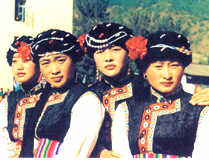 With a population of about 29,657 (as of 1990), the Pumi ethnic minority is mainly distributed in Lanping, Lijiang, Weixi and Yongsheng counties of Yunnan Province, as well as in the Yi Autonomous County of Ninglang. Some live in Muli and Yanyuan counties in Sichuan Province as well.
With a population of about 29,657 (as of 1990), the Pumi ethnic minority is mainly distributed in Lanping, Lijiang, Weixi and Yongsheng counties of Yunnan Province, as well as in the Yi Autonomous County of Ninglang. Some live in Muli and Yanyuan counties in Sichuan Province as well.
The Pumi ethnic minority has its own language, which belongs to the Tibeto-Burman Austronesian of the Chinese-Tibetan Phylum. They also have their own simple written language based on Tibetan letters, but now Chinese characters are widely used among the Pumis.
According to Pumi legends and historical records, ancient Pumis were a nomadic tribe, roaming the Qinghai-Tibetan Plateau. Later, their descendants moved south to warmer areas along the Hengduan Mountain Ranges. By the seventh century, the Pumis were living in southwestern Sichuan, constituting one of the major ethnic minorities in the Xichang Prefecture. During the Yuan period in the 13th century, the Pumi ethnic minority gradually settled down in Ninglang, Lijiang, Weixi and Lanping counties in western Dian (present Yunnan Province) areas. In 1960, following consultation with this ethnic minority, the official name of Salar ethnic minority was established.
The Pumis are largely engaged in farming. Nowadays, they have developed a large number of enterprises in mineral resources exploitation, and built quite a few power plants.
The Pumi people mostly worship nature and their ancestors. Some of them also believe in Daoism and Buddhism. Most of their festivals are related to their religion. Main festivals include the Spring Festival, the Dragon Boat Festival, the Torch Festival and the New Rice Festival, etc.
On the Spring Festival (the Chinese lunar New Year), the Pumis, cladding in their holiday best, are devoted to feasting, horse racing, and other activities.
